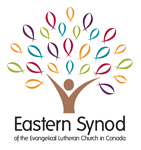Working Toward Racial Justice
In the Eastern Synod and Our Communities
We believe that all humans are created in the image of God. Since every person bears this image, each person is special – offering us a glimpse into the Divine. When members of our human family are treated in ways that do not demonstrate their value and dignity, it is a contradiction to our beliefs and values. It is God’s will for all people to be treated with love and respect; when we fail to do this, we go against the Kingdom of God.
Racial discrimination is a part of our society and world. It is a deep and persistent issue. White privilege exists; and the challenge is that many of us do not even perceive it because our daily lives are largely White. When you are surrounded by homogeny, then you do not notice any disparity. Many of us claim that we are not racist without a clear understanding of what racism really means. Others of us are very aware of racial injustice, having experienced it ourselves. All of us need to care about this injustice, to be aware of its presence in our communities, and to take steps together toward justice and equity.
At the Eastern Synod Assembly in June 2018, the gathered assembly participated in an evening of worship and learning about Racial Justice. Throughout the evening, we prayed, we considered some definitions, we participated in an exercise often referred to as ‘the colour-line’, and did some brainstorming about ways to move forward both as individuals and as a Synod. This resource is an effort to give the whole Synod an opportunity to participate in a similar exercise.
As you begin, it is very important to understand the need to create safe space for this conversation. We strongly encourage you to prepare your group for this activity; this preparation will look different depending on the make up of your group. Consider how your participants might feel, who might be centered out. Engage your group in this conversation about ensuring safe space, consider assigning a chaplain for the duration of the exercise. For participants of all races, the experience can range from disconcerting to traumatic; we strongly encourage you to give fair warning of the emotional nature of this exercise and to plan for follow up and pastoral care for individuals who experience distress. We also recommend allowing for people to opt-out of participating. Be mindful that the tools of Confession & Forgiveness that are included below can be very helpful to this learning process. Should you have questions or concerns about this, you are welcome to reach out to a member of the committee listed below.
Continue reading:
